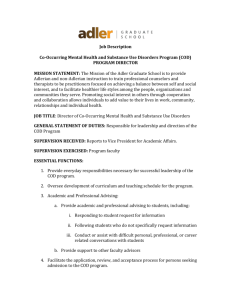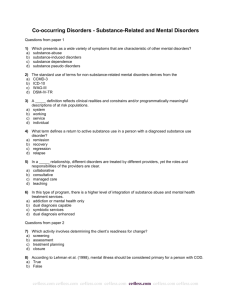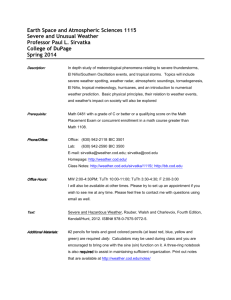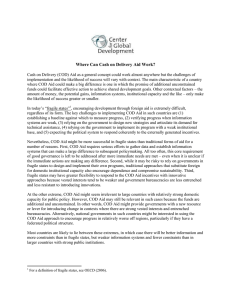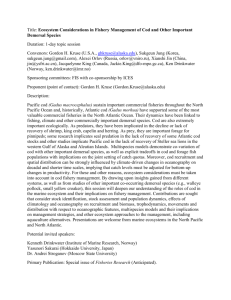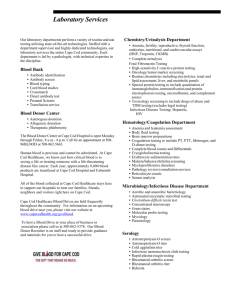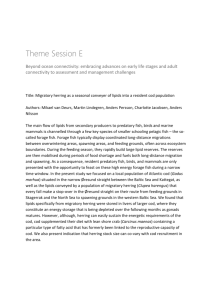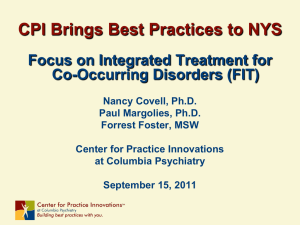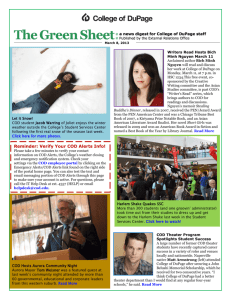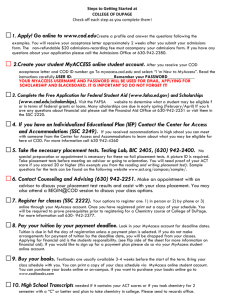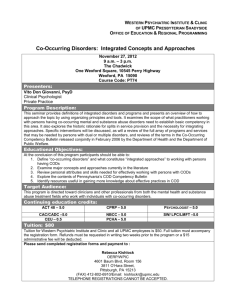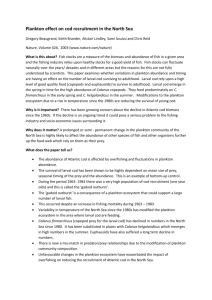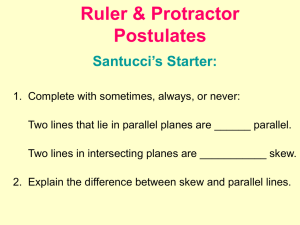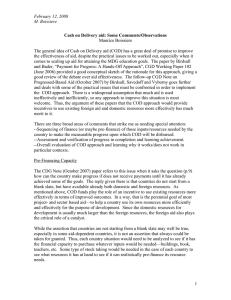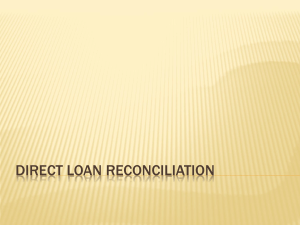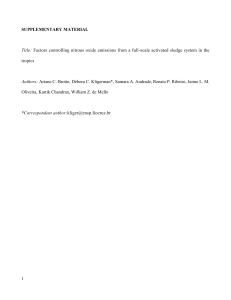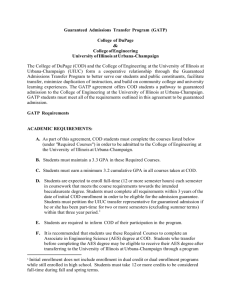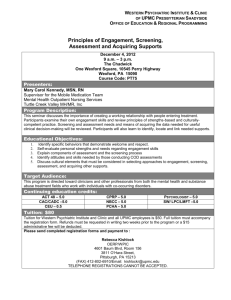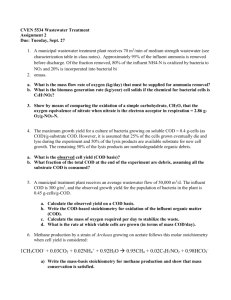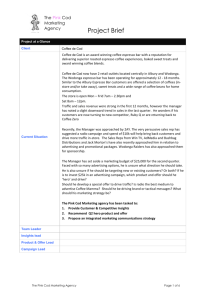Mutual Help Groups for People with Co
advertisement
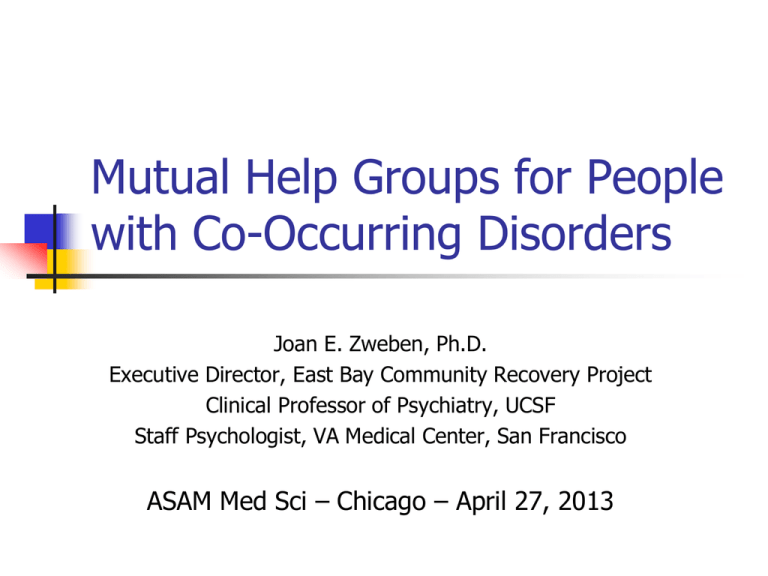
Mutual Help Groups for People with Co-Occurring Disorders Joan E. Zweben, Ph.D. Executive Director, East Bay Community Recovery Project Clinical Professor of Psychiatry, UCSF Staff Psychologist, VA Medical Center, San Francisco ASAM Med Sci – Chicago – April 27, 2013 Dilemmas for People with COD COD’s are the norm, not the exception Mental illness is an “outside” issue in the 12Step system Individuals describe lack of empathy and acceptance in traditional groups (Magura 2008) Bill W. castigated when he sought psychotherapy for severe depression (Hartigan 2000) Where to find a “home”? Outline Mutual help groups within mental health Integrated support groups for people with COD Preparing people with COD to attend meetings Mutual Help within Mental Health Basic Characteristics Antipsychotics fueled deinstitutionalization (1960’s forward); support groups flourished Many groups are supported by outside organizations: psychiatric institutions, govt entities, community organizations Membership need not consist of people with psychiatric disorders Some collect membership fees Recovery International Founder: Abraham Low, MD, 1937 Goal: reduce negative consequences of habituated thoughts and behaviors; prevent relapses leading to hospitalization (precursor to CBT) Peer-based training Five levels of fees: $30 - $1000 Currently 600 peer led community meetings in US and elsewhere Study Report: Univ Illinois, Chicago (2011) Decreased mental health sx Reduction in use of mental health & social services Improved self esteem; confidence in ability to achieve recovery Willingness to ask for help & support Increased social connectedness, hope, coping mastery ability, overall mental health Fountain House WANA (We Are Not Alone) Started in 1940’s in NY by Michael Obolensky to help transition and provide vehicle for socializing and fellowship Evolved into Fountain House, a psychosocial rehabilitation clubhouse community in the 1950’s, with the addition of professional staff. Emotions Anonymous (EA) Founded in St. Paul in 1971 Goal: working toward recovery from emotional difficulties through adapted version of 12-Steps Seen as a complementary support activity; recommended by mental health professionals Depressed Anonymous (DA) Founded 1986; formalized late 1990’s Goal: Empower people into therapeutic healing; “help ourselves and others escape the prison of depression” Medication, religion, not discussed at meetings Has closed online group; limited number of face-to-face meetings Schizophrenia Anonymous (SA) Founded 1985; 150 groups, 30 states and international Partner: SARDAA (Schiz & Related Disorders Alliance of America) Purpose: restore dignity; increase sense of purpose; improve attitudes and lives regarding illness; disseminate latest info; encourage recovery Effectiveness of Mutual-Aid Self-Help Participation (MH) Does involvement lead to improve psychological and social functioning? 12 studies met criteria for group characteristics, target problems, outcome measures, research design Promising evidence of benefits for people with chronic mental illness, depression/anxiety, bereavement Variable design quality; need more and better research Integrated Mutual Support Groups for People with CoOccurring Disorders Challenging Issues COD population is heterogeneous, varying in diagnosis and severity Emerged late 1980’s, but # groups still limited 50% with SMI have substance issues, but tailoring groups for them is difficult DRA: Dual Recovery Anonymous Launched 1989; Central Office established 1993; international by 2001 Requirements: desire to stop AOD use; desire to manage emotional & psychiatric illness in a constructive way Addresses concerns about misguided advice at other 12-Step mtgs Mtgs chaired and run by DRA members Double Trouble Founded in Philadelphia in 1987 Mtgs initially run by peers Professionals acted as advisors; later began running the groups Shifted away from self-help, grew into an agency providing psychiatric services Currently a component of psychiatric services DTR: Double Trouble in Recovery - I Started by Howard Vogel in 1989; moved to greater control by professional organizations Financial assistance by NY allowed them to train peer group leaders; consumers start and conduct groups, can get ongoing support Estimated 200-250 grps, mostly in NY area DTR: Double Trouble in Recovery - II Increasingly intertwined with federal, state, local agencies in provision of services Do not adhere to their stated nonaffiliation policy Hazelden now the exclusive publisher of materials and supplies Research on Dual Focus Groups - I Overemphasis on abstinence and insufficient attention to mental health issues were barriers to participation in single-topic groups (Havassy et al 2009) SMI: barriers were stigma, meds issues not addressed, difficulty in finding peers, decreased referrals from clinicians (Villano et al 2005). Research on Dual Focus Groups - II Enhanced engagement promotes participation (Bogenshutz 2005) Modified 12-step facilitation intervention increased attendance and decreased substance use during 12 week of tx (Nowinski et al, 1994). Change mechanisms (self efficacy, social support) similar to others (Bogenshutz 2007) Research on Dual Focus Groups - III Intensive referral intervention enhanced participation; better 6 month outcomes (Timko et al 2011) Pts attended 4 sessions; given information, discussion, practice opportunities Volunteer available to accompany them to meetings Male veterans also benefit from intensive referral efforts (Makin-Byrd et al 2011) Preparing People with COD to Attend Meetings Specialized & Mainstream Meetings Limited # specialized groups are available Mainstream clients in addition for stronger support system Prepare them to attend mainstream meetings; handle issues that can arise Use existing manuals & materials Benefits for People with COD Predictable, clear structure can be container for anxiety Pts who are anxious and depressed can be linked with assistance to get to mtg Simplicity & redundancy beneficial (e.g., cognitive impairment, thought disorder) “No crosstalk” is protective; relatively nonintrusive Preparing People with COD to Attend Meetings - I Familiarize pts with history, culture, traditions, rituals and other practices Address fears about groups (MAAEZ) SMI – case managers take pts to initial meetings; provide cell phone access when clients begin to go alone Preparing People with COD to Attend Meetings - II Select meetings carefully for people with SMI; look for tolerance of eccentric behavior Instruct pts how to behave (e.g., do not discuss delusions and hallucinations) Be alert for possibility that higher power can be incorporated into delusional system Preparing People with COD to Address Medication Issues Medication issues can be considered private, though honesty is strong value Use AA materials to validate the view that medication is compatible with recovery Role play handling of the medication issue if challenged in a meeting References Zweben, Joan E., & Ashbrook, Sarah. (2012). Mutual Help Groups for People with Co-Occurring Disorders. Journal of Groups in Addiction & Recovery, 7, 202222. Joan.Zweben@UCSF.edu Slides: www.ebcrp.org
